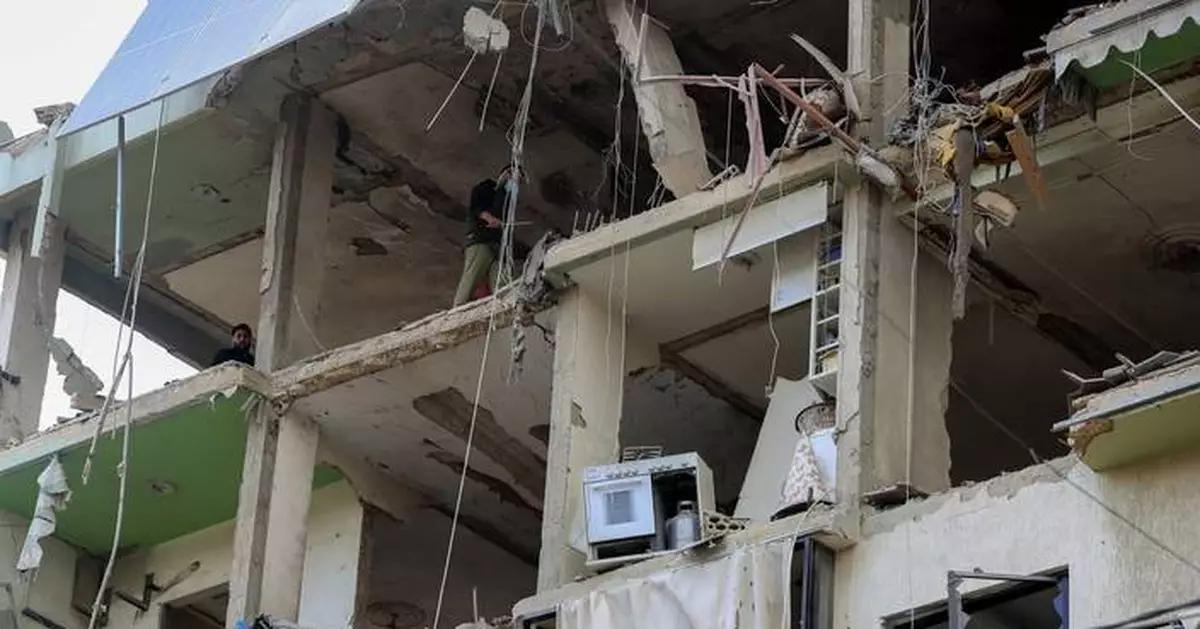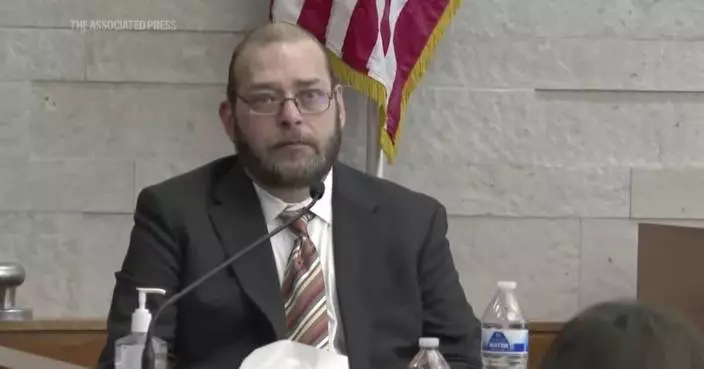BEIRUT (AP) — The 13-month war between Israel and Hezbollah has killed more than 3,000 people in Lebanon, the country’s Health Ministry said on Monday, more than double the number of people killed since their last major war two decades ago.
The war shows no signs of ending, and Israel has said it is carrying out new operations targeting Hezbollah infrastructure across Lebanon and in parts of Syria while Hezbollah continues to launch dozens of rockets into northern Israel.
Hezbollah began firing rockets into northern Israel the day after Hamas’ surprise attack into Israel on Oct. 7, 2023 ignited the war in Gaza. Hezbollah and Hamas are both allied with Iran.
For nearly a year, the conflict was mostly contained to the areas along the border between Israel and Lebanon. The conflict dramatically escalated on Sept. 23 with intense Israeli airstrikes on south and east Lebanon as well as Beirut’s southern suburbs, leaving hundreds dead and leading to the displacement of nearly 1.2 million people.
Israel began a ground invasion of south Lebanon on Oct. 1, causing wide destruction in border villages but making little advances on the ground inside Lebanon. Israel says it is destroying Hezbollah weapons and command centers near the border, including an extensive tunnel system built by Hezbollah.
The Lebanese Health Ministry said 16 people were killed and 90 injured in attacks on Sunday, bringing the death toll to 3,002. At least 13,492 have been injured. The ministry does not differentiate between civilians and Hezbollah fighters in its toll. Israel claimed hundreds of Hezbollah fighters have been killed.
In Israel, 72 people have been killed by Hezbollah attacks, including 30 soldiers, according to the prime minister's office. More than 60,000 people have been displaced from their homes.
Also on Monday, Israel announced it terminated the agreement facilitating the work of the U.N. agency for Palestinian refugees, the main aid provider in Gaza.
It was the first step in implementing legislation passed last week that would sever ties with the agency, which Israel says has been infiltrated by Hamas, and prevent it from operating in Israel.
The agency, known as UNRWA, denies the allegations and says it takes measures to ensure its neutrality.
The Israeli Foreign Ministry said in a statement Monday that it has notified the U.N. of the cancellation of an agreement dating back to 1967 that facilitates UNRWA’s work. It said UNRWA “is part of the problem in the Gaza Strip and not part of the solution.”
Israel controls all entry into Gaza, and aid groups groups have warned that the legislation could severely hamper UNRWA’s work, creating further obstacles to addressing a severe humanitarian crisis in Gaza.
Israel says that UNRWA is responsible for only 13% of aid entering Gaza and it says other U.N. agencies and aid groups can fill the gap. But aid organizations say UNRWA is essential, and the agency says the Israeli figures do not account for the key role it plays in coordinating aid deliveries.
“Without UNRWA coordination, without UNRWA logistics platforms ... no U.N. agency could operate at the scale required,” said Jonathan Fowler, a spokesman for the agency.
State Department spokesperson Matthew Miller said the US was clear about their opposition to the legislation, and gravely concerned about the insufficient number of aid trucks entering Gaza. “We have serious concerns about the implications of it being fully implemented, as well as our concerns about the underlying humanitarian situation in, Gaza, even before Israel passed the legislation,” he told reporters in Washington on Monday.
The agency provides education, health and other basic services to Palestinian refugees from the 1948 war surrounding Israel’s creation and their descendants, who now number nearly six million across the region. Refugee families make up the majority of Gaza’s population.
The remainder of the legislation is set to go into effect in three months.
—
Lidman reported from Jerusalem. Associated Press writer Matthew Lee contributed from Washington.
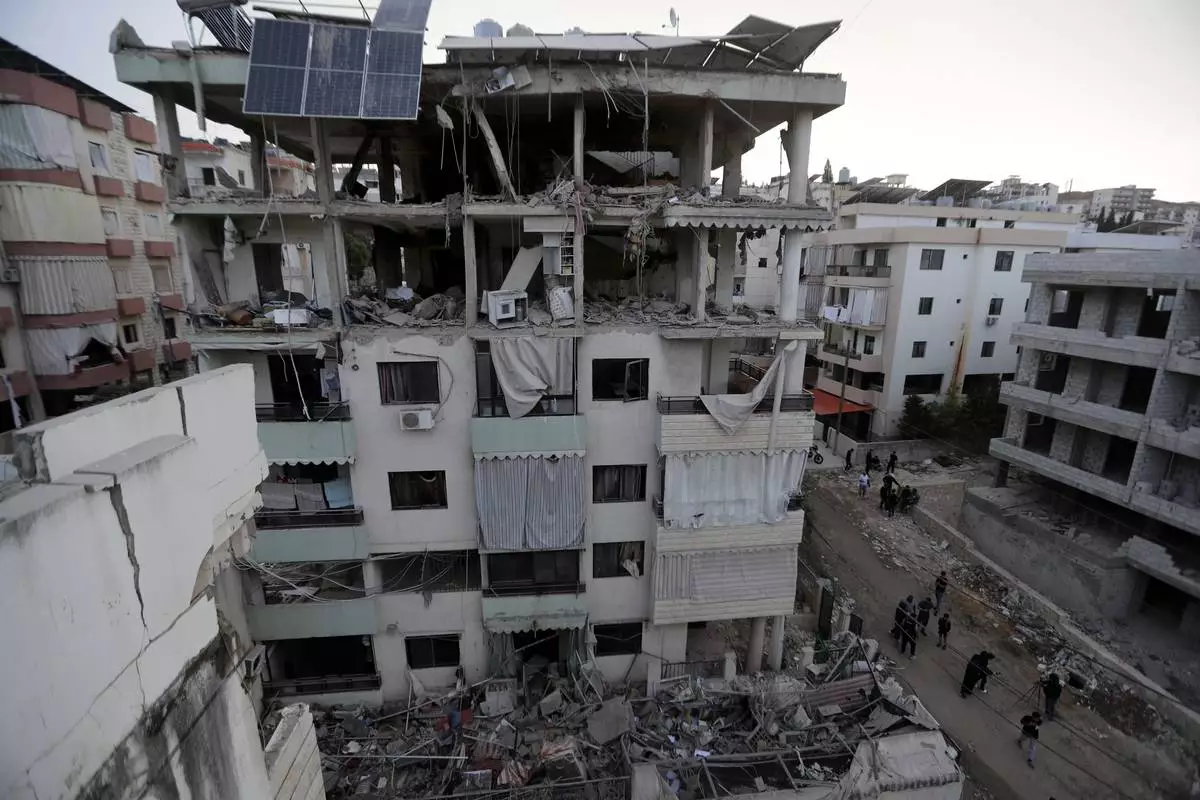
People walk past a destroyed building hit in an Israeli airstrike, in the southern port city of Sidon, Lebanon, Sunday, Nov. 3, 2024. (AP Photo/Mohammed Zaatari)
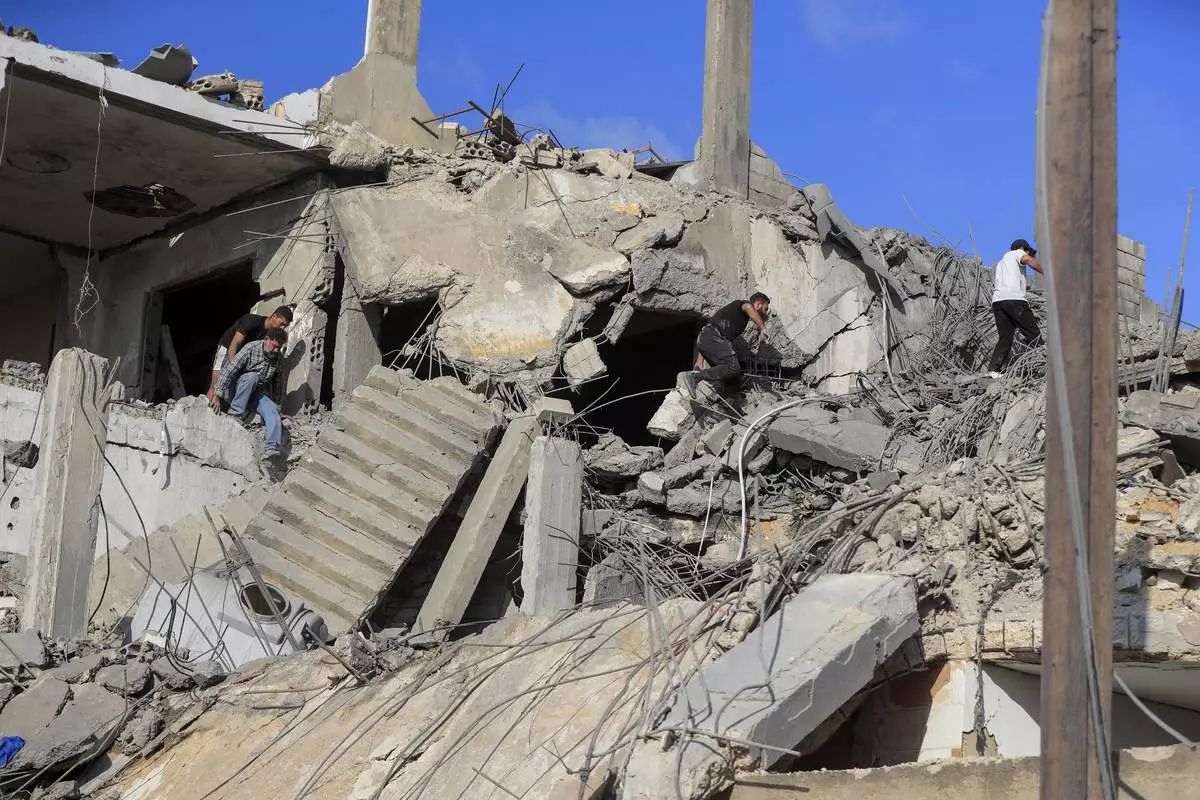
People search for victims at a destroyed building hit in an Israeli airstrike, in Ghaziyeh town, south Lebanon, Sunday, Nov. 3, 2024. (AP Photo/Mohammed Zaatari)
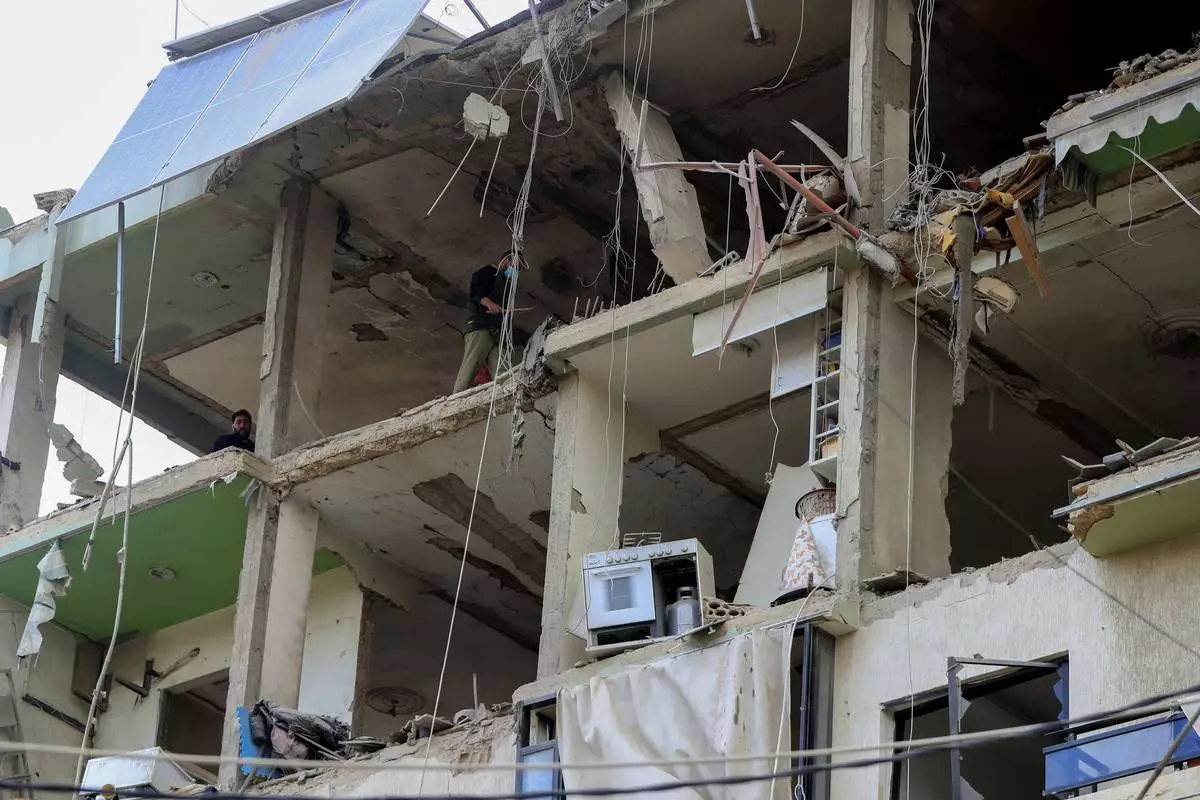
People inspect a destroyed building hit in an Israeli airstrike, in the southern port city of Sidon, Lebanon, Sunday, Nov. 3, 2024. (AP Photo/Mohammed Zaatari)
Unionized factory workers at Boeing were voting Monday whether to accept a contract offer or to continue their strike, which has lasted more than seven weeks and shut down production of most Boeing passenger planes.
A vote to ratify the contract on the eve of Election Day would clear the way for a major U.S. manufacturer and government contractor to resume airplane production. If members of the International Association of Machinists and Aerospace Workers vote for a third time to reject Boeing's offer, it would plunge the aerospace giant into further financial peril and uncertainty.
In its latest proposed contract, Boeing is offering pay raises of 38% over four years plus ratification and productivity bonuses. IAM District 751, which represents Boeing workers in the Pacific Northwest, endorsed the proposal, which is slightly more generous than one the machinists voted down nearly two weeks ago.
“It is time for our members to lock in these gains and confidently declare victory," the district leaders said in scheduling Monday's vote. "We believe asking members to stay on strike longer wouldn’t be right as we have achieved so much success.”
Union officials said they think they have gotten all they can though negotiations and a strike, and that if the current proposal is rejected, future offers from Boeing might be worse. They expect to announce the result of the vote late Monday.
Boeing says average annual pay for machinists is $75,608 and would rise to $119,309 in four years under the current offer.
Pensions were a key issue for workers who rejected the company's previous offers in September and October. In its new offer, Boeing did not meet their demand to restore a pension plan that was frozen nearly a decade ago.
If machinists ratify the contract now on the table, they would return to work by Nov. 12, according to the union.
The strike began Sept. 13 with an overwhelming 94.6% rejection of Boeing's offer to raise pay by 25% over four years — far less than the union’s original demand for 40% wage increases over three years.
Machinists voted down another offer — 35% raises over four years, and still no revival of pensions — on Oct. 23, the same day that Boeing reported a third-quarter loss of more than $6 billion. However, the offer received 36% support, up from 5% for the mid-September proposal, making Boeing leaders believe they were close to a deal.
In addition to a slightly larger pay increases, the new proposal includes a $12,000 contract ratification bonus, up from $7,000 in the previous offer, and larger company contributions to employees’ 401(k) retirement accounts.
Boeing also promises to build its next airline plane in the Seattle area. Union officials fear the company might withdraw the pledge if workers reject the new offer.
The strike drew the attention of the Biden administration. Acting Labor Secretary Julie Su intervened in the talks several times, including last week.
The labor standoff — the first strike by Boeing machinists since an eight-week walkout in 2008 — is the latest setback in a volatile year for the company.
Boeing came under several federal investigations after a door plug blew off a 737 Max plane during an Alaska Airlines flight in January. Federal regulators put limits on Boeing airplane production that they said would last until they felt confident about manufacturing safety at the company.
The door plug incident renewed concerns about the safety of the 737 Max. Two of the plane's crashed less than five months apart in 2018 and 2019, killing 346 people. The CEO whose effort to fix the company failed announced in March that he would step down. In July, Boeing agreed to plead guilty to conspiracy to commit fraud for deceiving regulators who approved the 737 Max.
As the strike dragged on, new CEO Kelly Ortberg announced about 17,000 layoffs and a stock sale to prevent the company’s credit rating from being cut to junk status. S&P and Fitch Ratings said last week that the $24.3 billion in stock and other securities will cover upcoming debt payments and reduce the risk of a credit downgrade.
The strike has created a cash crunch by depriving Boeing of money it gets when delivering new planes to airlines. The walkout at Seattle-area factories stopped production of the 737 Max, Boeing’s best-selling plane, and the 777 or “triple-seven” jet and the cargo-carrying version of its 767 plane.
Ortberg has conceded that trust in Boeing has declined, the company has too much debt, and “serious lapses in our performance” have disappointed many airline customers. But, he says, the company’s strengths include a backlog of airplane orders valued at a half-trillion dollars.
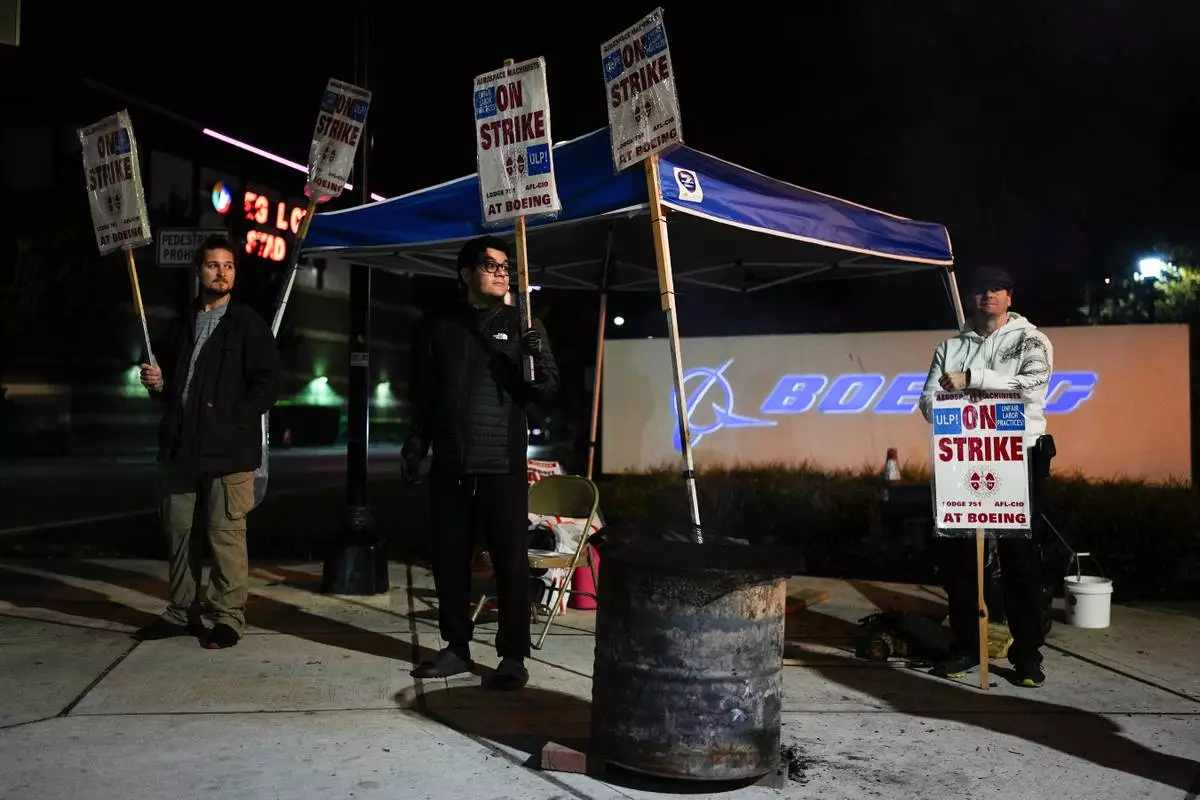
From left, Boeing employees Vance Meyring, Josue Ramirez and Joseph Mellon work the picket line after union members voted to reject a new contract offer from the company, Wednesday, Oct. 23, 2024, outside Boeing facilities in Renton, Wash. (AP Photo/Lindsey Wasson)
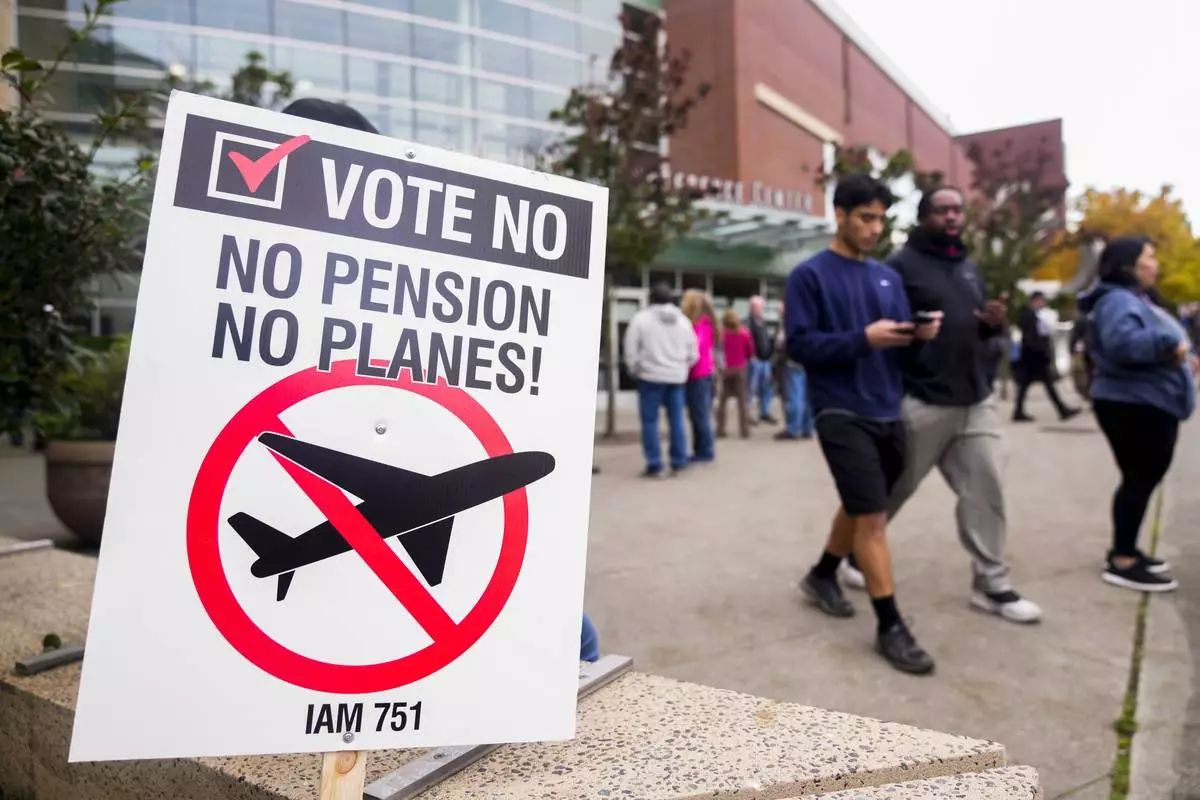
A picket sign sits outside the Angel of the Winds Arena as striking Boeing employees gather to cast their votes, Wednesday, Oct. 23, 2024, in Everett, Wash. (AP Photo/Lindsey Wasson)
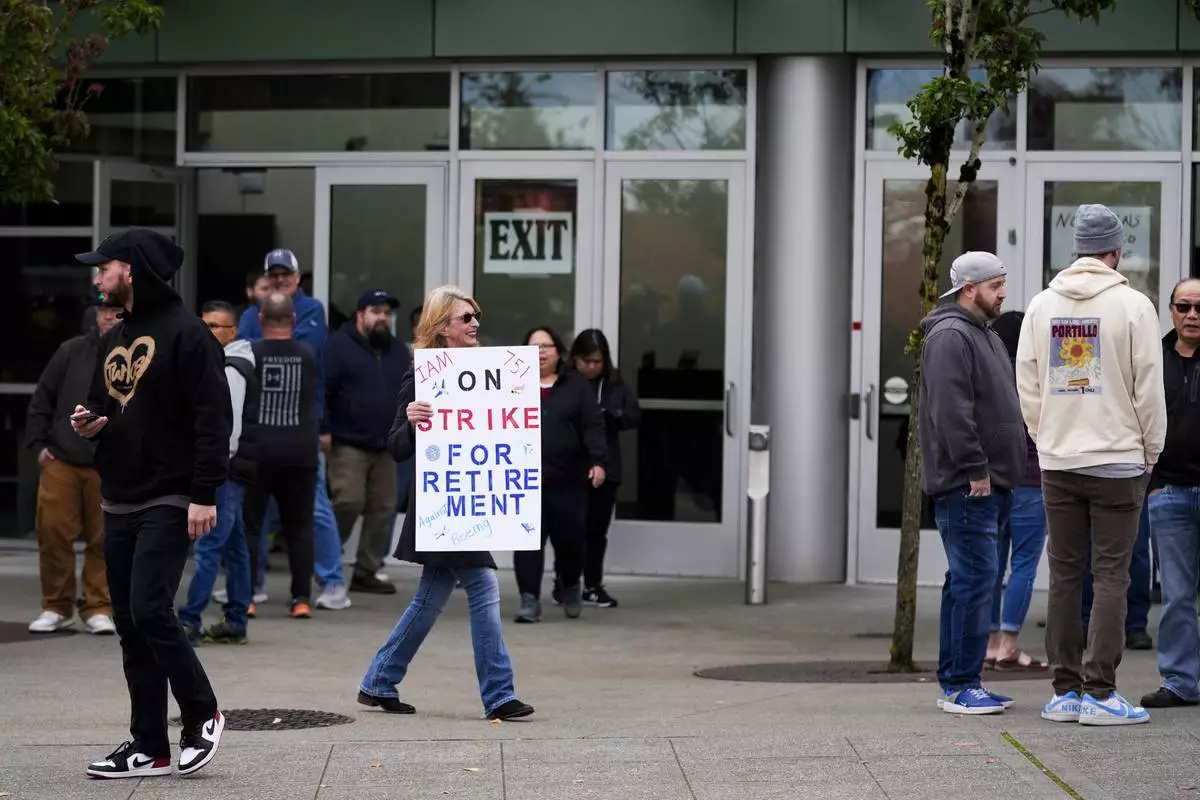
A worker holds a sign as Boeing employees vote on a new contract offer from the company, Wednesday, Oct. 23, 2024, at a voting location in the Angel of the Winds Arena in Everett, Wash. (AP Photo/Lindsey Wasson)
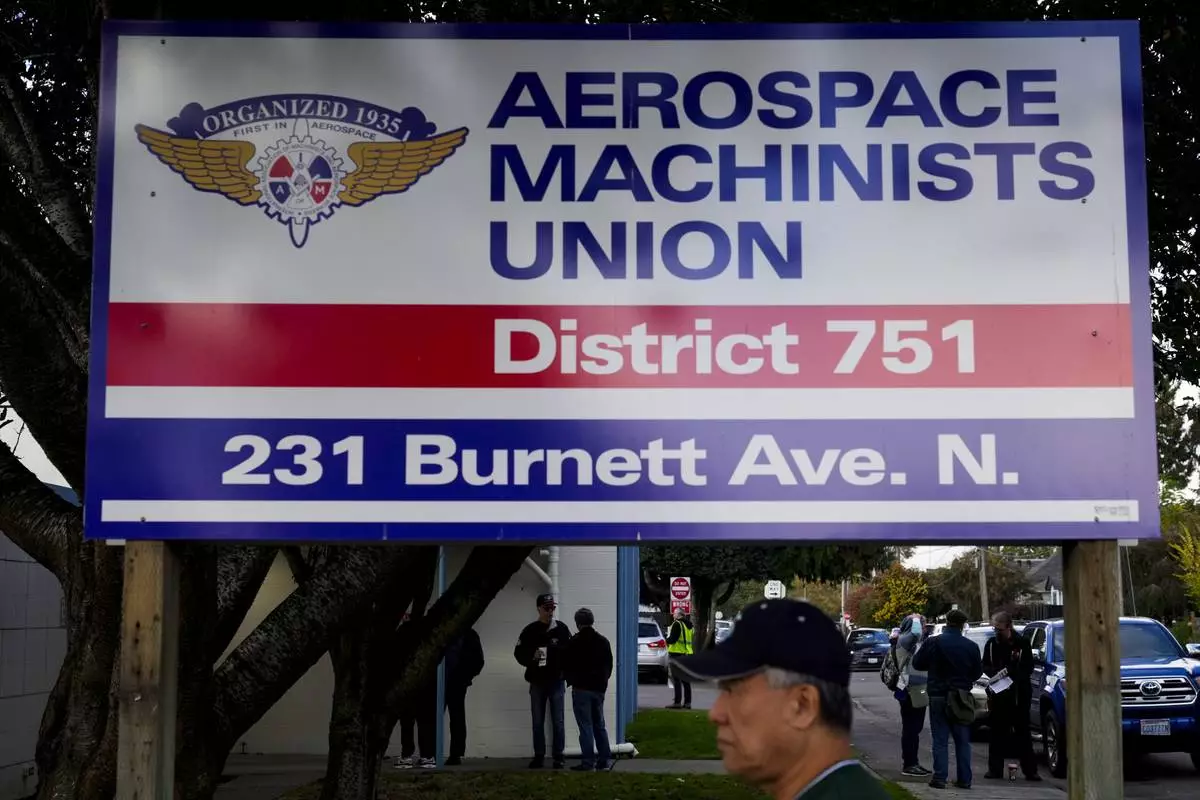
Boeing employees on strike arrive to vote on a new contract offer from the company Wednesday, Oct. 23, 2024, at the Aerospace Machinists Union hall in Renton, Wash. (AP Photo/Lindsey Wasson)
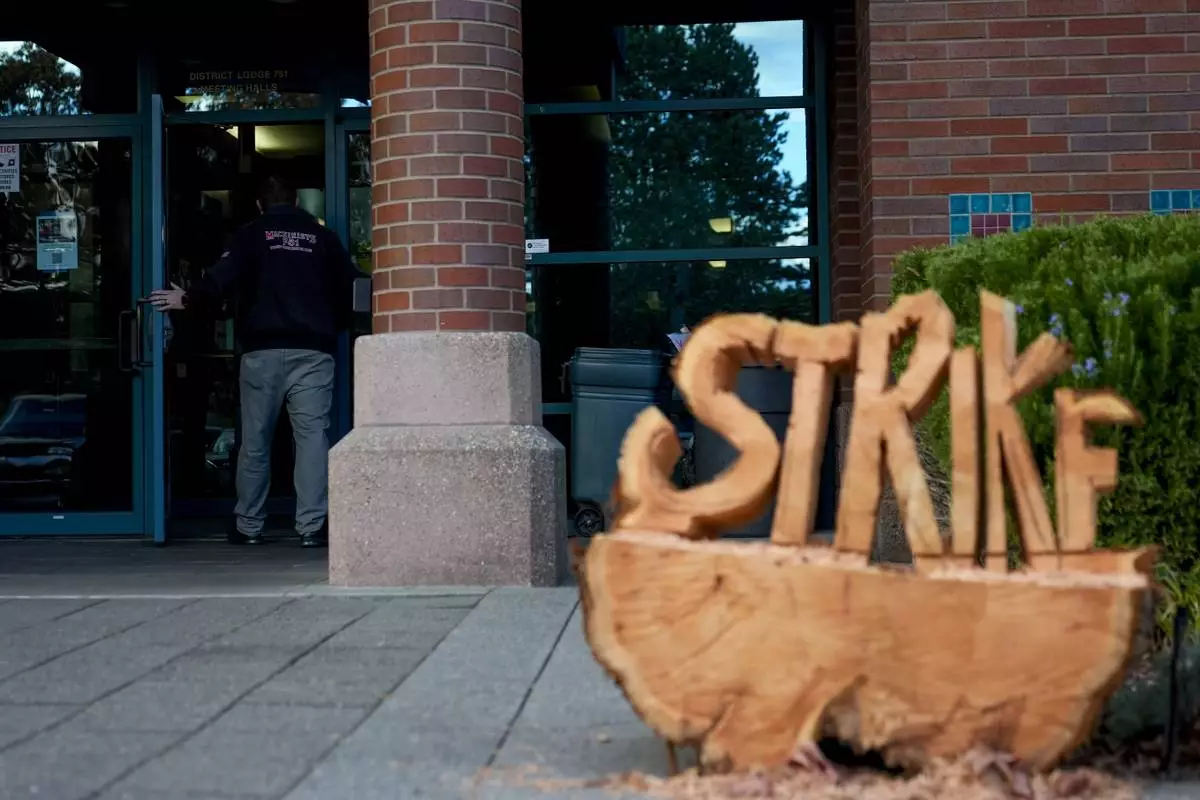
A Boeing employee walks by a sign carved out of wood while arriving to vote on a new contract offer from the company, Wednesday, Oct. 23, 2024, at Seattle Union Hall in Seattle. (AP Photo/Lindsey Wasson)

Boeing employees on strike arrive to vote on a new contract offer from the company, Wednesday, Oct. 23, 2024, at the Aerospace Machinists Union hall in Renton, Wash. (AP Photo/Lindsey Wasson)

A volunteer holds a vote to accept a new contract offer from Boeing, Wednesday, Oct. 23, 2024, at Seattle Union Hall in Seattle. (AP Photo/Lindsey Wasson)
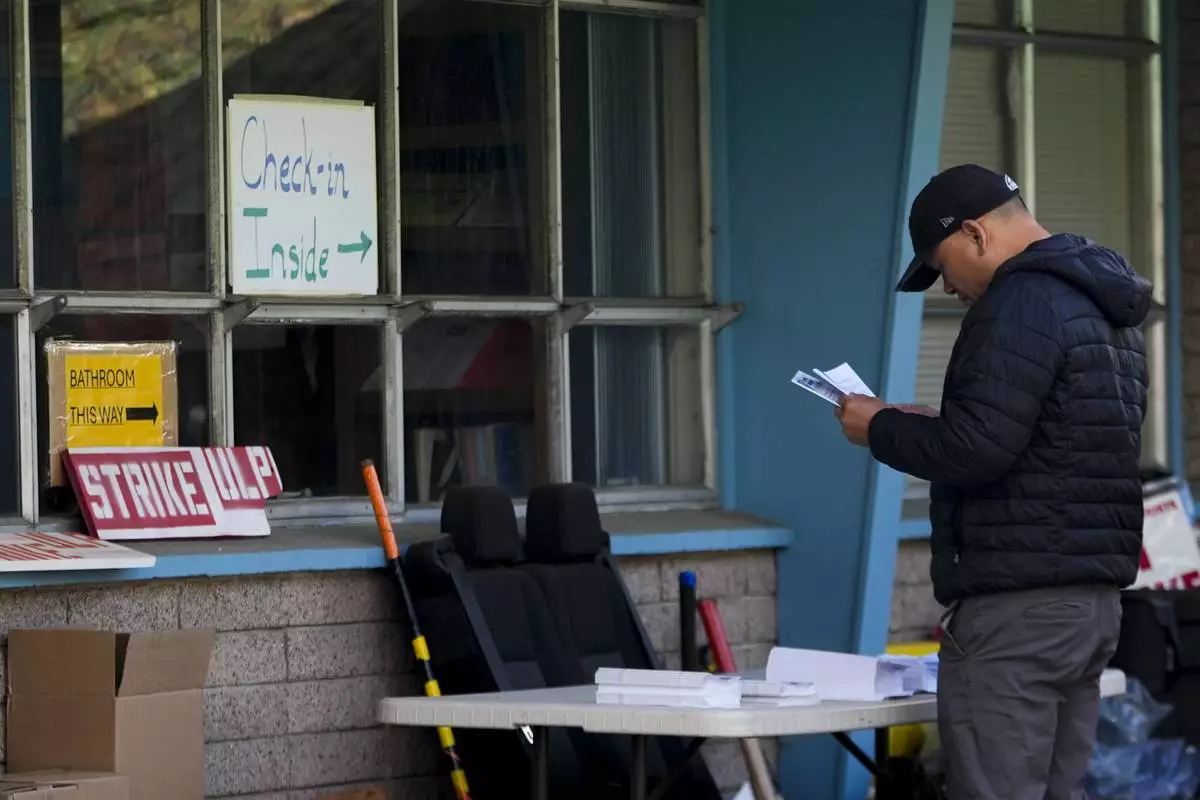
A Boeing employee looks at informational pamphlets before heading in to vote on a new contract offer from the company, Wednesday, Oct. 23, 2024, at the Aerospace Machinists Union hall in Renton, Wash. (AP Photo/Lindsey Wasson)





